Assessment 1: Cardiovascular Disease in Dementia and Antipsychotics
VerifiedAdded on 2023/04/25
|12
|3455
|474
Report
AI Summary
This report, prepared for a university assessment, investigates the correlation between antipsychotic medication use and the development of cardiovascular disease in older adults with dementia. It begins with an introduction outlining the prevalence of mental health issues and the increased use of antipsychotics, setting the stage for an examination of the health risks, particularly cardiovascular disease. The report provides an overview of the affected population, highlighting factors like abdominal obesity, hypertension, and sedentary lifestyles, and explores the impact of specific antipsychotic medications. A comprehensive literature review supports the findings, discussing the increased mortality and morbidity associated with cardiovascular disease, the role of diabetes, and the impact of oxidative stress. The report then addresses barriers to the identification and diagnosis of cardiovascular disease in this population, including cognitive impairments and a lack of family support. It concludes by discussing implications for nursing practice, emphasizing the importance of effective communication, monitoring, and multidisciplinary care. The report also highlights strategies for empowering patients and caregivers, such as education and the use of assistive technologies.
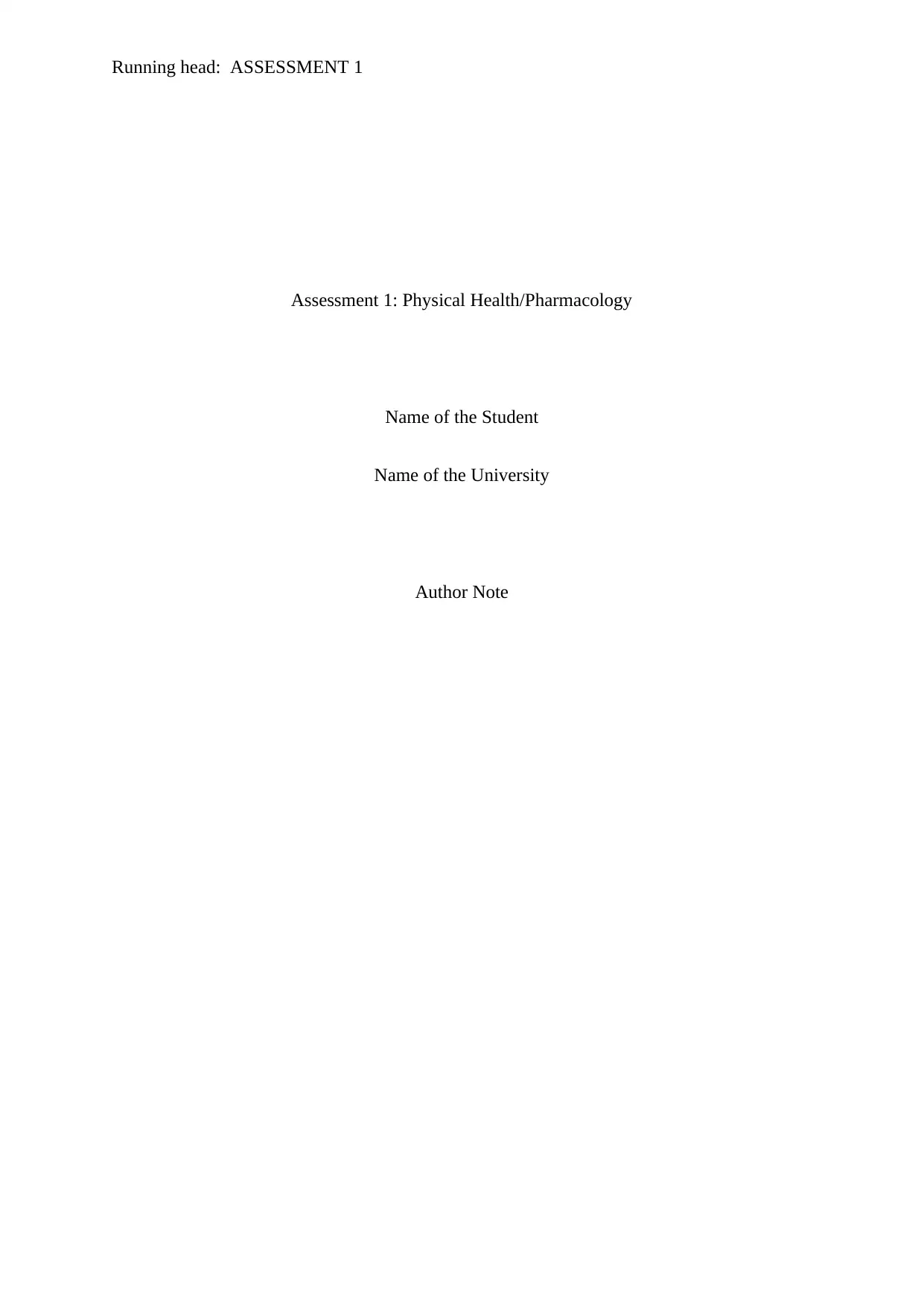
Running head: ASSESSMENT 1
Assessment 1: Physical Health/Pharmacology
Name of the Student
Name of the University
Author Note
Assessment 1: Physical Health/Pharmacology
Name of the Student
Name of the University
Author Note
Paraphrase This Document
Need a fresh take? Get an instant paraphrase of this document with our AI Paraphraser
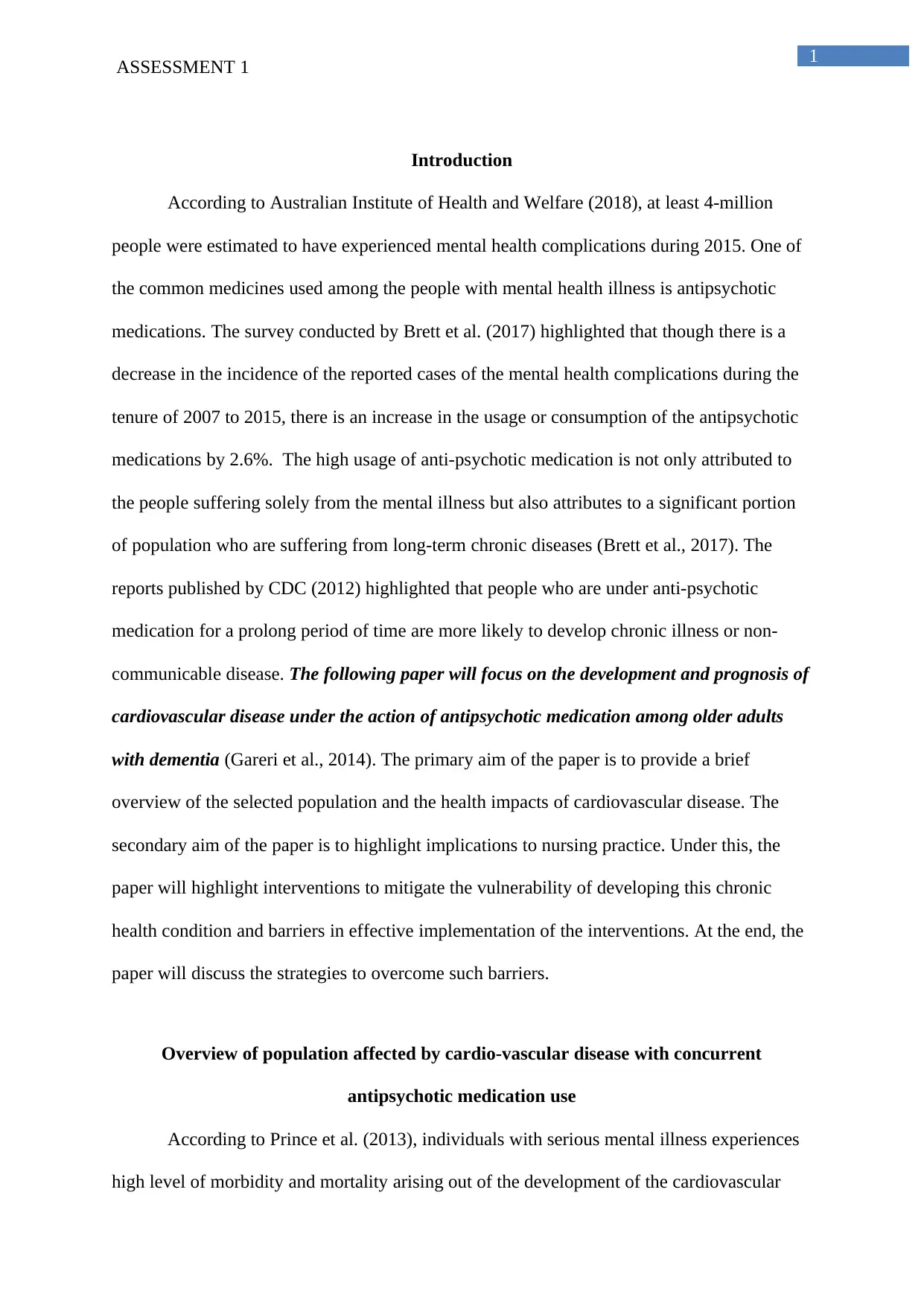
1
ASSESSMENT 1
Introduction
According to Australian Institute of Health and Welfare (2018), at least 4-million
people were estimated to have experienced mental health complications during 2015. One of
the common medicines used among the people with mental health illness is antipsychotic
medications. The survey conducted by Brett et al. (2017) highlighted that though there is a
decrease in the incidence of the reported cases of the mental health complications during the
tenure of 2007 to 2015, there is an increase in the usage or consumption of the antipsychotic
medications by 2.6%. The high usage of anti-psychotic medication is not only attributed to
the people suffering solely from the mental illness but also attributes to a significant portion
of population who are suffering from long-term chronic diseases (Brett et al., 2017). The
reports published by CDC (2012) highlighted that people who are under anti-psychotic
medication for a prolong period of time are more likely to develop chronic illness or non-
communicable disease. The following paper will focus on the development and prognosis of
cardiovascular disease under the action of antipsychotic medication among older adults
with dementia (Gareri et al., 2014). The primary aim of the paper is to provide a brief
overview of the selected population and the health impacts of cardiovascular disease. The
secondary aim of the paper is to highlight implications to nursing practice. Under this, the
paper will highlight interventions to mitigate the vulnerability of developing this chronic
health condition and barriers in effective implementation of the interventions. At the end, the
paper will discuss the strategies to overcome such barriers.
Overview of population affected by cardio-vascular disease with concurrent
antipsychotic medication use
According to Prince et al. (2013), individuals with serious mental illness experiences
high level of morbidity and mortality arising out of the development of the cardiovascular
ASSESSMENT 1
Introduction
According to Australian Institute of Health and Welfare (2018), at least 4-million
people were estimated to have experienced mental health complications during 2015. One of
the common medicines used among the people with mental health illness is antipsychotic
medications. The survey conducted by Brett et al. (2017) highlighted that though there is a
decrease in the incidence of the reported cases of the mental health complications during the
tenure of 2007 to 2015, there is an increase in the usage or consumption of the antipsychotic
medications by 2.6%. The high usage of anti-psychotic medication is not only attributed to
the people suffering solely from the mental illness but also attributes to a significant portion
of population who are suffering from long-term chronic diseases (Brett et al., 2017). The
reports published by CDC (2012) highlighted that people who are under anti-psychotic
medication for a prolong period of time are more likely to develop chronic illness or non-
communicable disease. The following paper will focus on the development and prognosis of
cardiovascular disease under the action of antipsychotic medication among older adults
with dementia (Gareri et al., 2014). The primary aim of the paper is to provide a brief
overview of the selected population and the health impacts of cardiovascular disease. The
secondary aim of the paper is to highlight implications to nursing practice. Under this, the
paper will highlight interventions to mitigate the vulnerability of developing this chronic
health condition and barriers in effective implementation of the interventions. At the end, the
paper will discuss the strategies to overcome such barriers.
Overview of population affected by cardio-vascular disease with concurrent
antipsychotic medication use
According to Prince et al. (2013), individuals with serious mental illness experiences
high level of morbidity and mortality arising out of the development of the cardiovascular
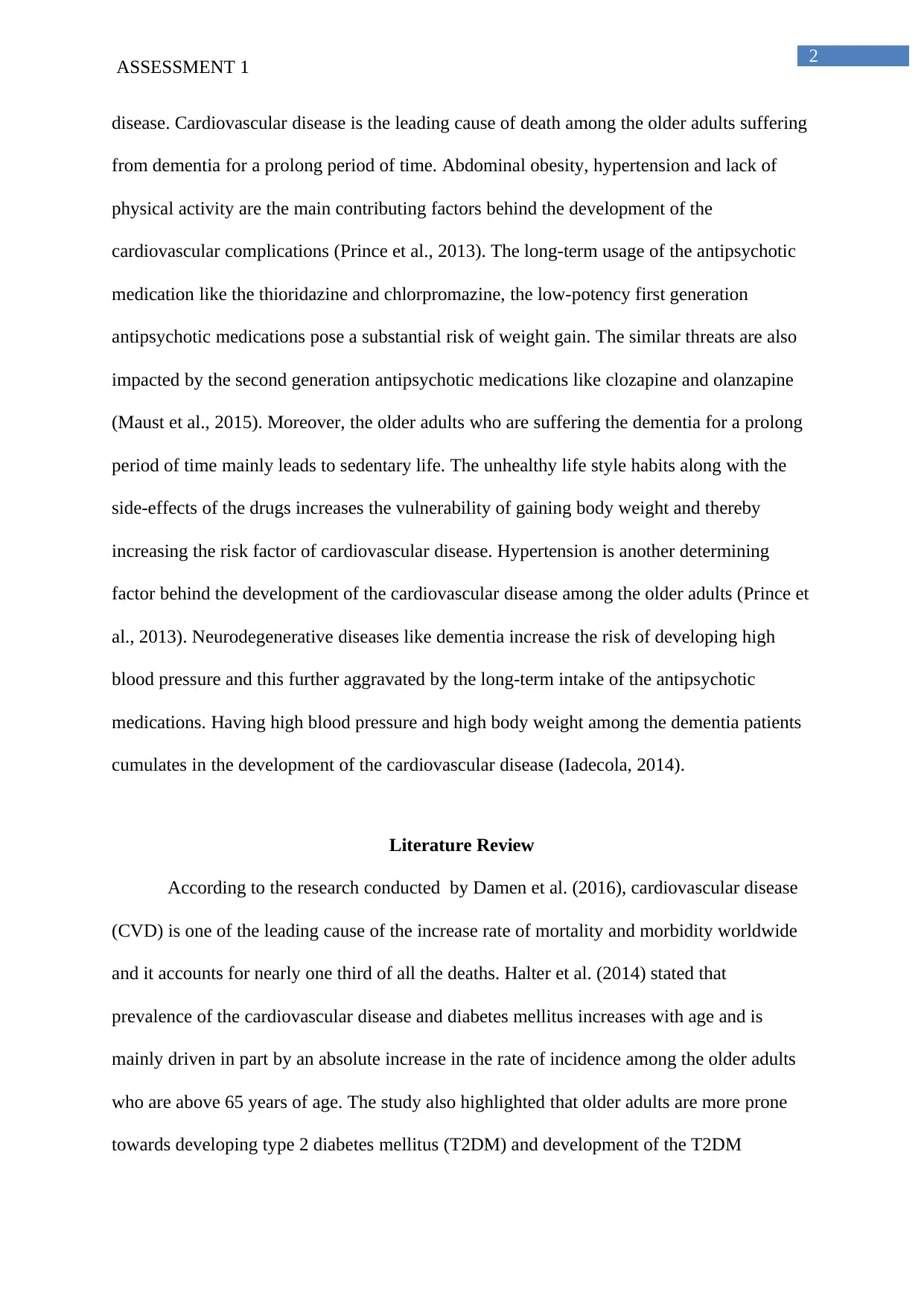
2
ASSESSMENT 1
disease. Cardiovascular disease is the leading cause of death among the older adults suffering
from dementia for a prolong period of time. Abdominal obesity, hypertension and lack of
physical activity are the main contributing factors behind the development of the
cardiovascular complications (Prince et al., 2013). The long-term usage of the antipsychotic
medication like the thioridazine and chlorpromazine, the low-potency first generation
antipsychotic medications pose a substantial risk of weight gain. The similar threats are also
impacted by the second generation antipsychotic medications like clozapine and olanzapine
(Maust et al., 2015). Moreover, the older adults who are suffering the dementia for a prolong
period of time mainly leads to sedentary life. The unhealthy life style habits along with the
side-effects of the drugs increases the vulnerability of gaining body weight and thereby
increasing the risk factor of cardiovascular disease. Hypertension is another determining
factor behind the development of the cardiovascular disease among the older adults (Prince et
al., 2013). Neurodegenerative diseases like dementia increase the risk of developing high
blood pressure and this further aggravated by the long-term intake of the antipsychotic
medications. Having high blood pressure and high body weight among the dementia patients
cumulates in the development of the cardiovascular disease (Iadecola, 2014).
Literature Review
According to the research conducted by Damen et al. (2016), cardiovascular disease
(CVD) is one of the leading cause of the increase rate of mortality and morbidity worldwide
and it accounts for nearly one third of all the deaths. Halter et al. (2014) stated that
prevalence of the cardiovascular disease and diabetes mellitus increases with age and is
mainly driven in part by an absolute increase in the rate of incidence among the older adults
who are above 65 years of age. The study also highlighted that older adults are more prone
towards developing type 2 diabetes mellitus (T2DM) and development of the T2DM
ASSESSMENT 1
disease. Cardiovascular disease is the leading cause of death among the older adults suffering
from dementia for a prolong period of time. Abdominal obesity, hypertension and lack of
physical activity are the main contributing factors behind the development of the
cardiovascular complications (Prince et al., 2013). The long-term usage of the antipsychotic
medication like the thioridazine and chlorpromazine, the low-potency first generation
antipsychotic medications pose a substantial risk of weight gain. The similar threats are also
impacted by the second generation antipsychotic medications like clozapine and olanzapine
(Maust et al., 2015). Moreover, the older adults who are suffering the dementia for a prolong
period of time mainly leads to sedentary life. The unhealthy life style habits along with the
side-effects of the drugs increases the vulnerability of gaining body weight and thereby
increasing the risk factor of cardiovascular disease. Hypertension is another determining
factor behind the development of the cardiovascular disease among the older adults (Prince et
al., 2013). Neurodegenerative diseases like dementia increase the risk of developing high
blood pressure and this further aggravated by the long-term intake of the antipsychotic
medications. Having high blood pressure and high body weight among the dementia patients
cumulates in the development of the cardiovascular disease (Iadecola, 2014).
Literature Review
According to the research conducted by Damen et al. (2016), cardiovascular disease
(CVD) is one of the leading cause of the increase rate of mortality and morbidity worldwide
and it accounts for nearly one third of all the deaths. Halter et al. (2014) stated that
prevalence of the cardiovascular disease and diabetes mellitus increases with age and is
mainly driven in part by an absolute increase in the rate of incidence among the older adults
who are above 65 years of age. The study also highlighted that older adults are more prone
towards developing type 2 diabetes mellitus (T2DM) and development of the T2DM
⊘ This is a preview!⊘
Do you want full access?
Subscribe today to unlock all pages.

Trusted by 1+ million students worldwide
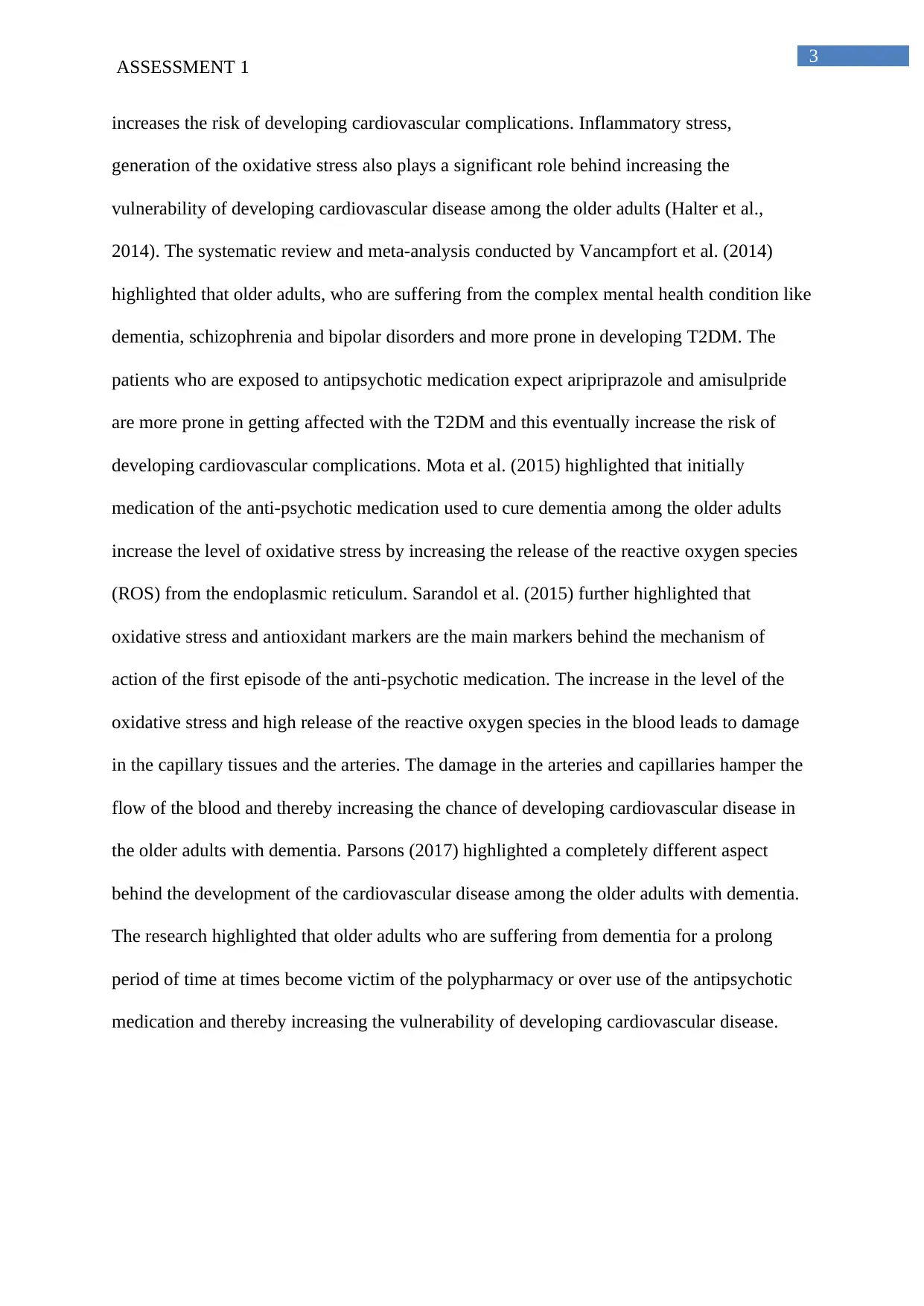
3
ASSESSMENT 1
increases the risk of developing cardiovascular complications. Inflammatory stress,
generation of the oxidative stress also plays a significant role behind increasing the
vulnerability of developing cardiovascular disease among the older adults (Halter et al.,
2014). The systematic review and meta-analysis conducted by Vancampfort et al. (2014)
highlighted that older adults, who are suffering from the complex mental health condition like
dementia, schizophrenia and bipolar disorders and more prone in developing T2DM. The
patients who are exposed to antipsychotic medication expect aripriprazole and amisulpride
are more prone in getting affected with the T2DM and this eventually increase the risk of
developing cardiovascular complications. Mota et al. (2015) highlighted that initially
medication of the anti-psychotic medication used to cure dementia among the older adults
increase the level of oxidative stress by increasing the release of the reactive oxygen species
(ROS) from the endoplasmic reticulum. Sarandol et al. (2015) further highlighted that
oxidative stress and antioxidant markers are the main markers behind the mechanism of
action of the first episode of the anti-psychotic medication. The increase in the level of the
oxidative stress and high release of the reactive oxygen species in the blood leads to damage
in the capillary tissues and the arteries. The damage in the arteries and capillaries hamper the
flow of the blood and thereby increasing the chance of developing cardiovascular disease in
the older adults with dementia. Parsons (2017) highlighted a completely different aspect
behind the development of the cardiovascular disease among the older adults with dementia.
The research highlighted that older adults who are suffering from dementia for a prolong
period of time at times become victim of the polypharmacy or over use of the antipsychotic
medication and thereby increasing the vulnerability of developing cardiovascular disease.
ASSESSMENT 1
increases the risk of developing cardiovascular complications. Inflammatory stress,
generation of the oxidative stress also plays a significant role behind increasing the
vulnerability of developing cardiovascular disease among the older adults (Halter et al.,
2014). The systematic review and meta-analysis conducted by Vancampfort et al. (2014)
highlighted that older adults, who are suffering from the complex mental health condition like
dementia, schizophrenia and bipolar disorders and more prone in developing T2DM. The
patients who are exposed to antipsychotic medication expect aripriprazole and amisulpride
are more prone in getting affected with the T2DM and this eventually increase the risk of
developing cardiovascular complications. Mota et al. (2015) highlighted that initially
medication of the anti-psychotic medication used to cure dementia among the older adults
increase the level of oxidative stress by increasing the release of the reactive oxygen species
(ROS) from the endoplasmic reticulum. Sarandol et al. (2015) further highlighted that
oxidative stress and antioxidant markers are the main markers behind the mechanism of
action of the first episode of the anti-psychotic medication. The increase in the level of the
oxidative stress and high release of the reactive oxygen species in the blood leads to damage
in the capillary tissues and the arteries. The damage in the arteries and capillaries hamper the
flow of the blood and thereby increasing the chance of developing cardiovascular disease in
the older adults with dementia. Parsons (2017) highlighted a completely different aspect
behind the development of the cardiovascular disease among the older adults with dementia.
The research highlighted that older adults who are suffering from dementia for a prolong
period of time at times become victim of the polypharmacy or over use of the antipsychotic
medication and thereby increasing the vulnerability of developing cardiovascular disease.
Paraphrase This Document
Need a fresh take? Get an instant paraphrase of this document with our AI Paraphraser
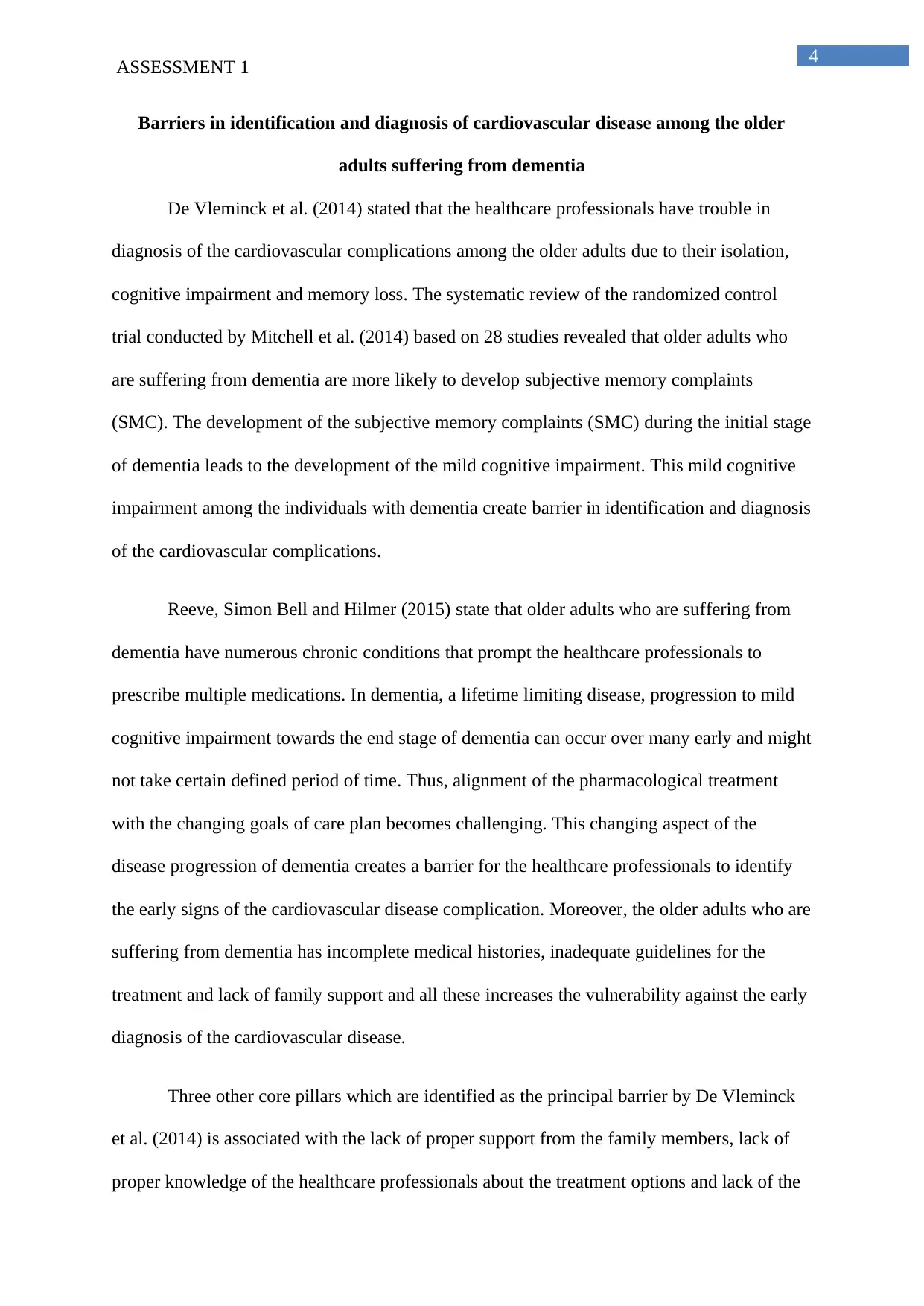
4
ASSESSMENT 1
Barriers in identification and diagnosis of cardiovascular disease among the older
adults suffering from dementia
De Vleminck et al. (2014) stated that the healthcare professionals have trouble in
diagnosis of the cardiovascular complications among the older adults due to their isolation,
cognitive impairment and memory loss. The systematic review of the randomized control
trial conducted by Mitchell et al. (2014) based on 28 studies revealed that older adults who
are suffering from dementia are more likely to develop subjective memory complaints
(SMC). The development of the subjective memory complaints (SMC) during the initial stage
of dementia leads to the development of the mild cognitive impairment. This mild cognitive
impairment among the individuals with dementia create barrier in identification and diagnosis
of the cardiovascular complications.
Reeve, Simon Bell and Hilmer (2015) state that older adults who are suffering from
dementia have numerous chronic conditions that prompt the healthcare professionals to
prescribe multiple medications. In dementia, a lifetime limiting disease, progression to mild
cognitive impairment towards the end stage of dementia can occur over many early and might
not take certain defined period of time. Thus, alignment of the pharmacological treatment
with the changing goals of care plan becomes challenging. This changing aspect of the
disease progression of dementia creates a barrier for the healthcare professionals to identify
the early signs of the cardiovascular disease complication. Moreover, the older adults who are
suffering from dementia has incomplete medical histories, inadequate guidelines for the
treatment and lack of family support and all these increases the vulnerability against the early
diagnosis of the cardiovascular disease.
Three other core pillars which are identified as the principal barrier by De Vleminck
et al. (2014) is associated with the lack of proper support from the family members, lack of
proper knowledge of the healthcare professionals about the treatment options and lack of the
ASSESSMENT 1
Barriers in identification and diagnosis of cardiovascular disease among the older
adults suffering from dementia
De Vleminck et al. (2014) stated that the healthcare professionals have trouble in
diagnosis of the cardiovascular complications among the older adults due to their isolation,
cognitive impairment and memory loss. The systematic review of the randomized control
trial conducted by Mitchell et al. (2014) based on 28 studies revealed that older adults who
are suffering from dementia are more likely to develop subjective memory complaints
(SMC). The development of the subjective memory complaints (SMC) during the initial stage
of dementia leads to the development of the mild cognitive impairment. This mild cognitive
impairment among the individuals with dementia create barrier in identification and diagnosis
of the cardiovascular complications.
Reeve, Simon Bell and Hilmer (2015) state that older adults who are suffering from
dementia have numerous chronic conditions that prompt the healthcare professionals to
prescribe multiple medications. In dementia, a lifetime limiting disease, progression to mild
cognitive impairment towards the end stage of dementia can occur over many early and might
not take certain defined period of time. Thus, alignment of the pharmacological treatment
with the changing goals of care plan becomes challenging. This changing aspect of the
disease progression of dementia creates a barrier for the healthcare professionals to identify
the early signs of the cardiovascular disease complication. Moreover, the older adults who are
suffering from dementia has incomplete medical histories, inadequate guidelines for the
treatment and lack of family support and all these increases the vulnerability against the early
diagnosis of the cardiovascular disease.
Three other core pillars which are identified as the principal barrier by De Vleminck
et al. (2014) is associated with the lack of proper support from the family members, lack of
proper knowledge of the healthcare professionals about the treatment options and lack of the
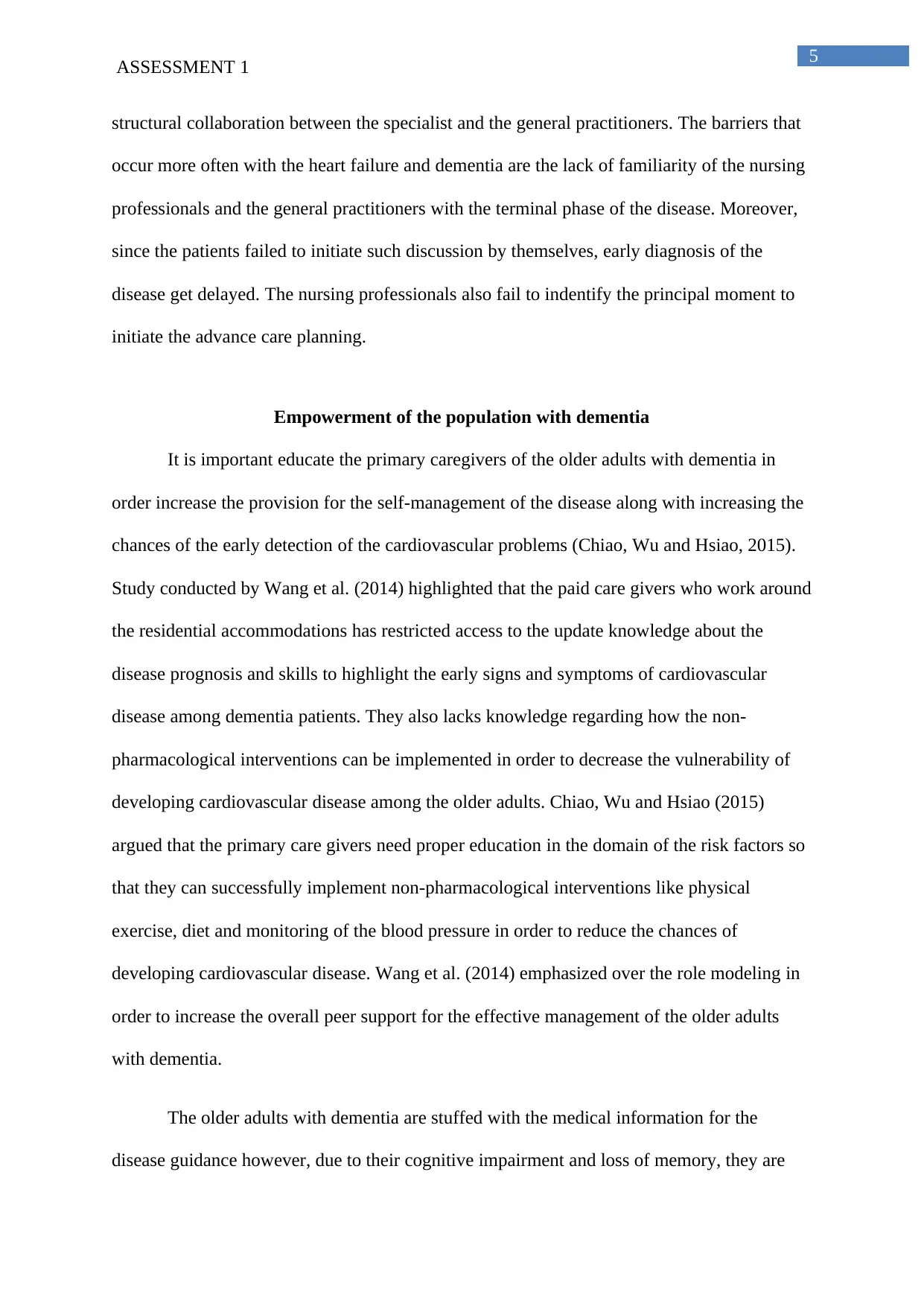
5
ASSESSMENT 1
structural collaboration between the specialist and the general practitioners. The barriers that
occur more often with the heart failure and dementia are the lack of familiarity of the nursing
professionals and the general practitioners with the terminal phase of the disease. Moreover,
since the patients failed to initiate such discussion by themselves, early diagnosis of the
disease get delayed. The nursing professionals also fail to indentify the principal moment to
initiate the advance care planning.
Empowerment of the population with dementia
It is important educate the primary caregivers of the older adults with dementia in
order increase the provision for the self-management of the disease along with increasing the
chances of the early detection of the cardiovascular problems (Chiao, Wu and Hsiao, 2015).
Study conducted by Wang et al. (2014) highlighted that the paid care givers who work around
the residential accommodations has restricted access to the update knowledge about the
disease prognosis and skills to highlight the early signs and symptoms of cardiovascular
disease among dementia patients. They also lacks knowledge regarding how the non-
pharmacological interventions can be implemented in order to decrease the vulnerability of
developing cardiovascular disease among the older adults. Chiao, Wu and Hsiao (2015)
argued that the primary care givers need proper education in the domain of the risk factors so
that they can successfully implement non-pharmacological interventions like physical
exercise, diet and monitoring of the blood pressure in order to reduce the chances of
developing cardiovascular disease. Wang et al. (2014) emphasized over the role modeling in
order to increase the overall peer support for the effective management of the older adults
with dementia.
The older adults with dementia are stuffed with the medical information for the
disease guidance however, due to their cognitive impairment and loss of memory, they are
ASSESSMENT 1
structural collaboration between the specialist and the general practitioners. The barriers that
occur more often with the heart failure and dementia are the lack of familiarity of the nursing
professionals and the general practitioners with the terminal phase of the disease. Moreover,
since the patients failed to initiate such discussion by themselves, early diagnosis of the
disease get delayed. The nursing professionals also fail to indentify the principal moment to
initiate the advance care planning.
Empowerment of the population with dementia
It is important educate the primary caregivers of the older adults with dementia in
order increase the provision for the self-management of the disease along with increasing the
chances of the early detection of the cardiovascular problems (Chiao, Wu and Hsiao, 2015).
Study conducted by Wang et al. (2014) highlighted that the paid care givers who work around
the residential accommodations has restricted access to the update knowledge about the
disease prognosis and skills to highlight the early signs and symptoms of cardiovascular
disease among dementia patients. They also lacks knowledge regarding how the non-
pharmacological interventions can be implemented in order to decrease the vulnerability of
developing cardiovascular disease among the older adults. Chiao, Wu and Hsiao (2015)
argued that the primary care givers need proper education in the domain of the risk factors so
that they can successfully implement non-pharmacological interventions like physical
exercise, diet and monitoring of the blood pressure in order to reduce the chances of
developing cardiovascular disease. Wang et al. (2014) emphasized over the role modeling in
order to increase the overall peer support for the effective management of the older adults
with dementia.
The older adults with dementia are stuffed with the medical information for the
disease guidance however, due to their cognitive impairment and loss of memory, they are
⊘ This is a preview!⊘
Do you want full access?
Subscribe today to unlock all pages.

Trusted by 1+ million students worldwide
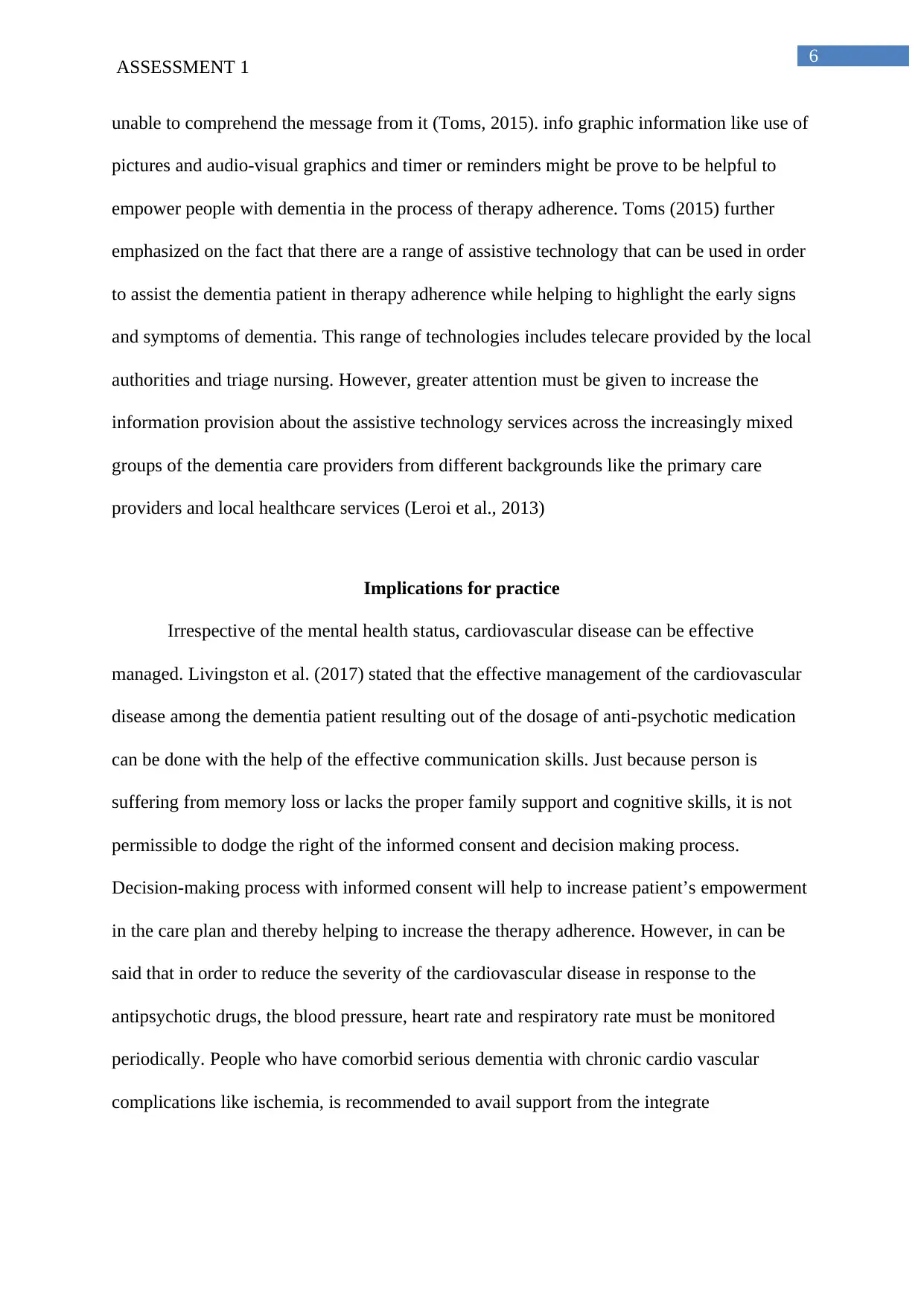
6
ASSESSMENT 1
unable to comprehend the message from it (Toms, 2015). info graphic information like use of
pictures and audio-visual graphics and timer or reminders might be prove to be helpful to
empower people with dementia in the process of therapy adherence. Toms (2015) further
emphasized on the fact that there are a range of assistive technology that can be used in order
to assist the dementia patient in therapy adherence while helping to highlight the early signs
and symptoms of dementia. This range of technologies includes telecare provided by the local
authorities and triage nursing. However, greater attention must be given to increase the
information provision about the assistive technology services across the increasingly mixed
groups of the dementia care providers from different backgrounds like the primary care
providers and local healthcare services (Leroi et al., 2013)
Implications for practice
Irrespective of the mental health status, cardiovascular disease can be effective
managed. Livingston et al. (2017) stated that the effective management of the cardiovascular
disease among the dementia patient resulting out of the dosage of anti-psychotic medication
can be done with the help of the effective communication skills. Just because person is
suffering from memory loss or lacks the proper family support and cognitive skills, it is not
permissible to dodge the right of the informed consent and decision making process.
Decision-making process with informed consent will help to increase patient’s empowerment
in the care plan and thereby helping to increase the therapy adherence. However, in can be
said that in order to reduce the severity of the cardiovascular disease in response to the
antipsychotic drugs, the blood pressure, heart rate and respiratory rate must be monitored
periodically. People who have comorbid serious dementia with chronic cardio vascular
complications like ischemia, is recommended to avail support from the integrate
ASSESSMENT 1
unable to comprehend the message from it (Toms, 2015). info graphic information like use of
pictures and audio-visual graphics and timer or reminders might be prove to be helpful to
empower people with dementia in the process of therapy adherence. Toms (2015) further
emphasized on the fact that there are a range of assistive technology that can be used in order
to assist the dementia patient in therapy adherence while helping to highlight the early signs
and symptoms of dementia. This range of technologies includes telecare provided by the local
authorities and triage nursing. However, greater attention must be given to increase the
information provision about the assistive technology services across the increasingly mixed
groups of the dementia care providers from different backgrounds like the primary care
providers and local healthcare services (Leroi et al., 2013)
Implications for practice
Irrespective of the mental health status, cardiovascular disease can be effective
managed. Livingston et al. (2017) stated that the effective management of the cardiovascular
disease among the dementia patient resulting out of the dosage of anti-psychotic medication
can be done with the help of the effective communication skills. Just because person is
suffering from memory loss or lacks the proper family support and cognitive skills, it is not
permissible to dodge the right of the informed consent and decision making process.
Decision-making process with informed consent will help to increase patient’s empowerment
in the care plan and thereby helping to increase the therapy adherence. However, in can be
said that in order to reduce the severity of the cardiovascular disease in response to the
antipsychotic drugs, the blood pressure, heart rate and respiratory rate must be monitored
periodically. People who have comorbid serious dementia with chronic cardio vascular
complications like ischemia, is recommended to avail support from the integrate
Paraphrase This Document
Need a fresh take? Get an instant paraphrase of this document with our AI Paraphraser
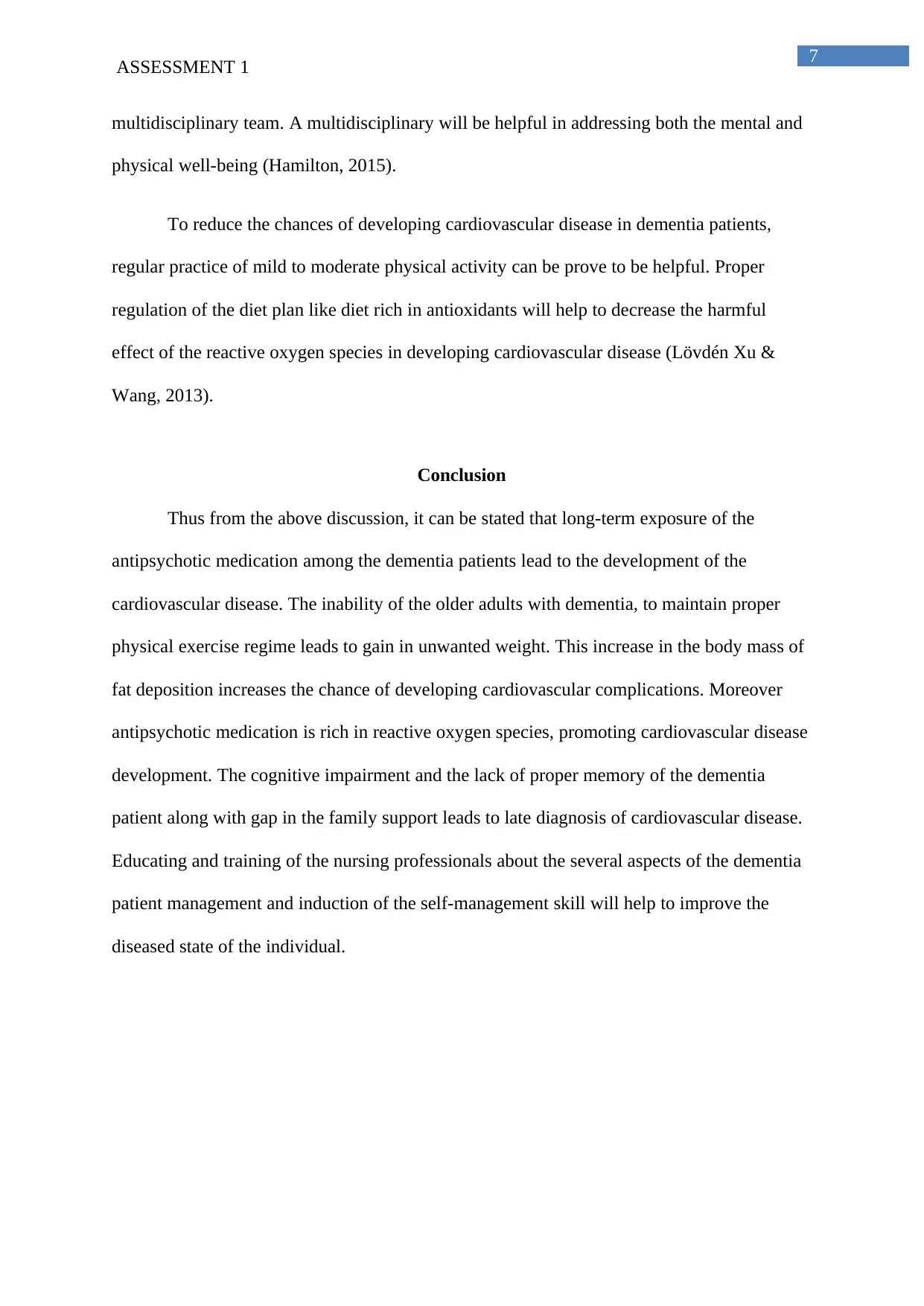
7
ASSESSMENT 1
multidisciplinary team. A multidisciplinary will be helpful in addressing both the mental and
physical well-being (Hamilton, 2015).
To reduce the chances of developing cardiovascular disease in dementia patients,
regular practice of mild to moderate physical activity can be prove to be helpful. Proper
regulation of the diet plan like diet rich in antioxidants will help to decrease the harmful
effect of the reactive oxygen species in developing cardiovascular disease (Lövdén Xu &
Wang, 2013).
Conclusion
Thus from the above discussion, it can be stated that long-term exposure of the
antipsychotic medication among the dementia patients lead to the development of the
cardiovascular disease. The inability of the older adults with dementia, to maintain proper
physical exercise regime leads to gain in unwanted weight. This increase in the body mass of
fat deposition increases the chance of developing cardiovascular complications. Moreover
antipsychotic medication is rich in reactive oxygen species, promoting cardiovascular disease
development. The cognitive impairment and the lack of proper memory of the dementia
patient along with gap in the family support leads to late diagnosis of cardiovascular disease.
Educating and training of the nursing professionals about the several aspects of the dementia
patient management and induction of the self-management skill will help to improve the
diseased state of the individual.
ASSESSMENT 1
multidisciplinary team. A multidisciplinary will be helpful in addressing both the mental and
physical well-being (Hamilton, 2015).
To reduce the chances of developing cardiovascular disease in dementia patients,
regular practice of mild to moderate physical activity can be prove to be helpful. Proper
regulation of the diet plan like diet rich in antioxidants will help to decrease the harmful
effect of the reactive oxygen species in developing cardiovascular disease (Lövdén Xu &
Wang, 2013).
Conclusion
Thus from the above discussion, it can be stated that long-term exposure of the
antipsychotic medication among the dementia patients lead to the development of the
cardiovascular disease. The inability of the older adults with dementia, to maintain proper
physical exercise regime leads to gain in unwanted weight. This increase in the body mass of
fat deposition increases the chance of developing cardiovascular complications. Moreover
antipsychotic medication is rich in reactive oxygen species, promoting cardiovascular disease
development. The cognitive impairment and the lack of proper memory of the dementia
patient along with gap in the family support leads to late diagnosis of cardiovascular disease.
Educating and training of the nursing professionals about the several aspects of the dementia
patient management and induction of the self-management skill will help to improve the
diseased state of the individual.
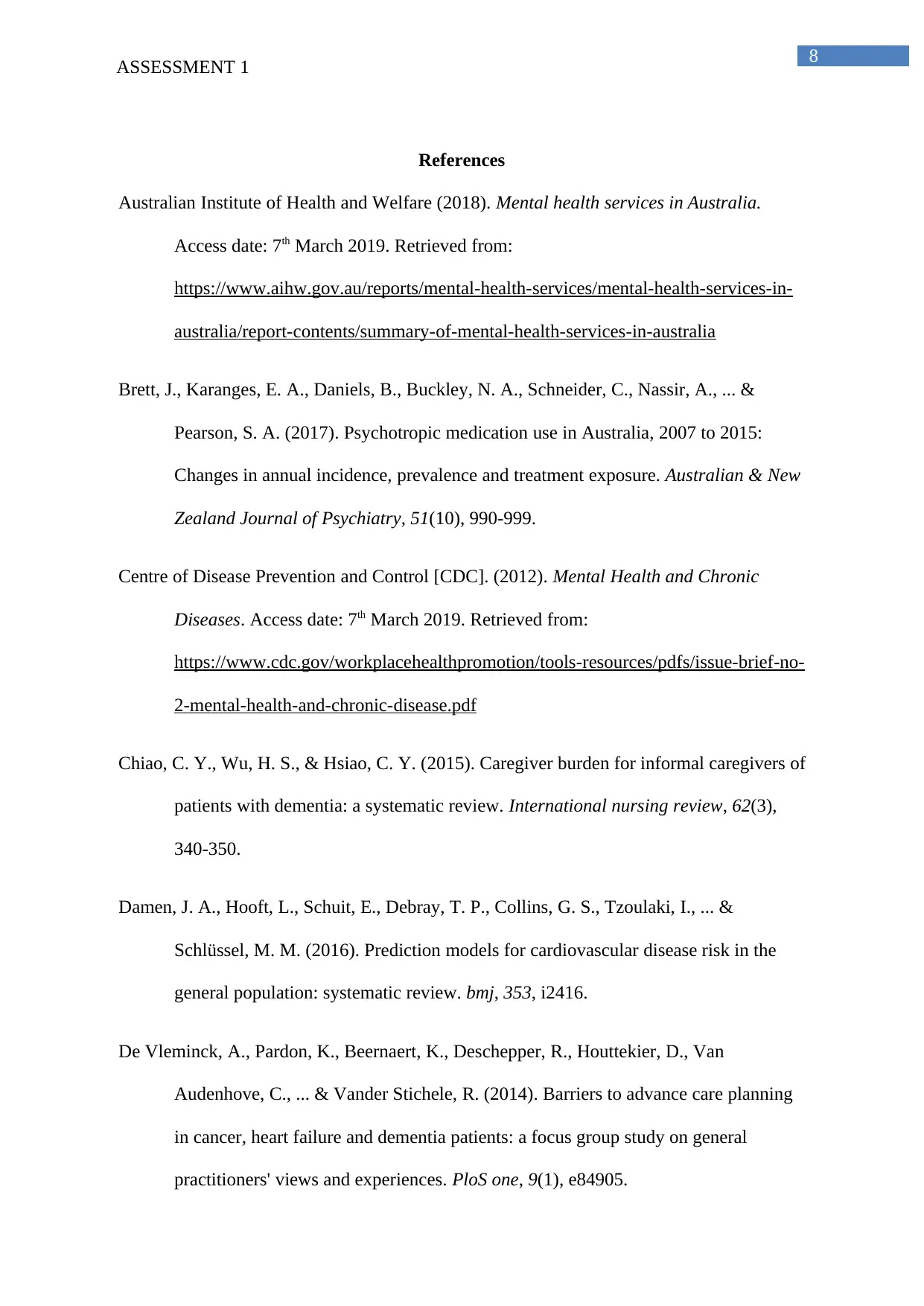
8
ASSESSMENT 1
References
Australian Institute of Health and Welfare (2018). Mental health services in Australia.
Access date: 7th March 2019. Retrieved from:
https://www.aihw.gov.au/reports/mental-health-services/mental-health-services-in-
australia/report-contents/summary-of-mental-health-services-in-australia
Brett, J., Karanges, E. A., Daniels, B., Buckley, N. A., Schneider, C., Nassir, A., ... &
Pearson, S. A. (2017). Psychotropic medication use in Australia, 2007 to 2015:
Changes in annual incidence, prevalence and treatment exposure. Australian & New
Zealand Journal of Psychiatry, 51(10), 990-999.
Centre of Disease Prevention and Control [CDC]. (2012). Mental Health and Chronic
Diseases. Access date: 7th March 2019. Retrieved from:
https://www.cdc.gov/workplacehealthpromotion/tools-resources/pdfs/issue-brief-no-
2-mental-health-and-chronic-disease.pdf
Chiao, C. Y., Wu, H. S., & Hsiao, C. Y. (2015). Caregiver burden for informal caregivers of
patients with dementia: a systematic review. International nursing review, 62(3),
340-350.
Damen, J. A., Hooft, L., Schuit, E., Debray, T. P., Collins, G. S., Tzoulaki, I., ... &
Schlüssel, M. M. (2016). Prediction models for cardiovascular disease risk in the
general population: systematic review. bmj, 353, i2416.
De Vleminck, A., Pardon, K., Beernaert, K., Deschepper, R., Houttekier, D., Van
Audenhove, C., ... & Vander Stichele, R. (2014). Barriers to advance care planning
in cancer, heart failure and dementia patients: a focus group study on general
practitioners' views and experiences. PloS one, 9(1), e84905.
ASSESSMENT 1
References
Australian Institute of Health and Welfare (2018). Mental health services in Australia.
Access date: 7th March 2019. Retrieved from:
https://www.aihw.gov.au/reports/mental-health-services/mental-health-services-in-
australia/report-contents/summary-of-mental-health-services-in-australia
Brett, J., Karanges, E. A., Daniels, B., Buckley, N. A., Schneider, C., Nassir, A., ... &
Pearson, S. A. (2017). Psychotropic medication use in Australia, 2007 to 2015:
Changes in annual incidence, prevalence and treatment exposure. Australian & New
Zealand Journal of Psychiatry, 51(10), 990-999.
Centre of Disease Prevention and Control [CDC]. (2012). Mental Health and Chronic
Diseases. Access date: 7th March 2019. Retrieved from:
https://www.cdc.gov/workplacehealthpromotion/tools-resources/pdfs/issue-brief-no-
2-mental-health-and-chronic-disease.pdf
Chiao, C. Y., Wu, H. S., & Hsiao, C. Y. (2015). Caregiver burden for informal caregivers of
patients with dementia: a systematic review. International nursing review, 62(3),
340-350.
Damen, J. A., Hooft, L., Schuit, E., Debray, T. P., Collins, G. S., Tzoulaki, I., ... &
Schlüssel, M. M. (2016). Prediction models for cardiovascular disease risk in the
general population: systematic review. bmj, 353, i2416.
De Vleminck, A., Pardon, K., Beernaert, K., Deschepper, R., Houttekier, D., Van
Audenhove, C., ... & Vander Stichele, R. (2014). Barriers to advance care planning
in cancer, heart failure and dementia patients: a focus group study on general
practitioners' views and experiences. PloS one, 9(1), e84905.
⊘ This is a preview!⊘
Do you want full access?
Subscribe today to unlock all pages.

Trusted by 1+ million students worldwide
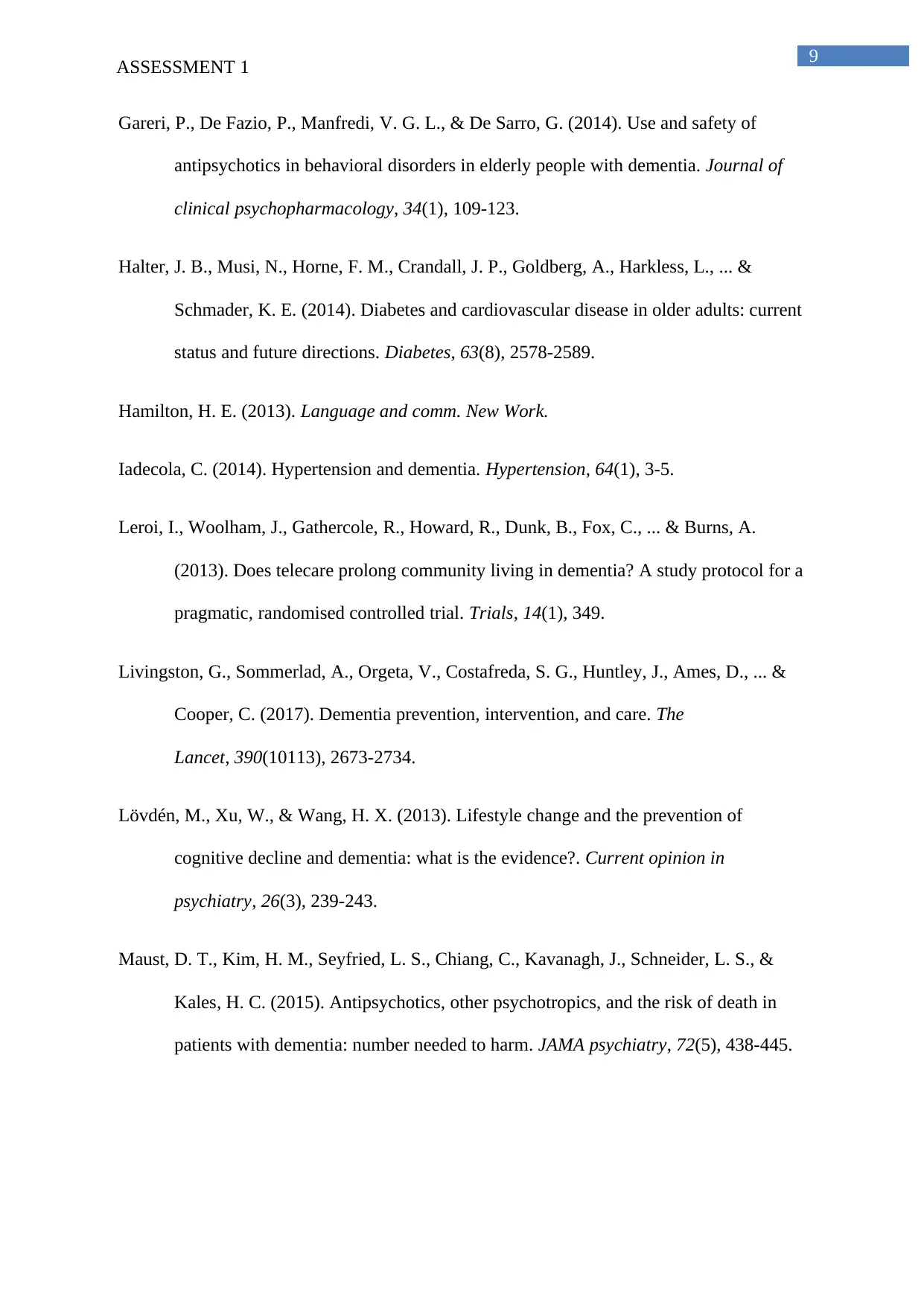
9
ASSESSMENT 1
Gareri, P., De Fazio, P., Manfredi, V. G. L., & De Sarro, G. (2014). Use and safety of
antipsychotics in behavioral disorders in elderly people with dementia. Journal of
clinical psychopharmacology, 34(1), 109-123.
Halter, J. B., Musi, N., Horne, F. M., Crandall, J. P., Goldberg, A., Harkless, L., ... &
Schmader, K. E. (2014). Diabetes and cardiovascular disease in older adults: current
status and future directions. Diabetes, 63(8), 2578-2589.
Hamilton, H. E. (2013). Language and comm. New Work.
Iadecola, C. (2014). Hypertension and dementia. Hypertension, 64(1), 3-5.
Leroi, I., Woolham, J., Gathercole, R., Howard, R., Dunk, B., Fox, C., ... & Burns, A.
(2013). Does telecare prolong community living in dementia? A study protocol for a
pragmatic, randomised controlled trial. Trials, 14(1), 349.
Livingston, G., Sommerlad, A., Orgeta, V., Costafreda, S. G., Huntley, J., Ames, D., ... &
Cooper, C. (2017). Dementia prevention, intervention, and care. The
Lancet, 390(10113), 2673-2734.
Lövdén, M., Xu, W., & Wang, H. X. (2013). Lifestyle change and the prevention of
cognitive decline and dementia: what is the evidence?. Current opinion in
psychiatry, 26(3), 239-243.
Maust, D. T., Kim, H. M., Seyfried, L. S., Chiang, C., Kavanagh, J., Schneider, L. S., &
Kales, H. C. (2015). Antipsychotics, other psychotropics, and the risk of death in
patients with dementia: number needed to harm. JAMA psychiatry, 72(5), 438-445.
ASSESSMENT 1
Gareri, P., De Fazio, P., Manfredi, V. G. L., & De Sarro, G. (2014). Use and safety of
antipsychotics in behavioral disorders in elderly people with dementia. Journal of
clinical psychopharmacology, 34(1), 109-123.
Halter, J. B., Musi, N., Horne, F. M., Crandall, J. P., Goldberg, A., Harkless, L., ... &
Schmader, K. E. (2014). Diabetes and cardiovascular disease in older adults: current
status and future directions. Diabetes, 63(8), 2578-2589.
Hamilton, H. E. (2013). Language and comm. New Work.
Iadecola, C. (2014). Hypertension and dementia. Hypertension, 64(1), 3-5.
Leroi, I., Woolham, J., Gathercole, R., Howard, R., Dunk, B., Fox, C., ... & Burns, A.
(2013). Does telecare prolong community living in dementia? A study protocol for a
pragmatic, randomised controlled trial. Trials, 14(1), 349.
Livingston, G., Sommerlad, A., Orgeta, V., Costafreda, S. G., Huntley, J., Ames, D., ... &
Cooper, C. (2017). Dementia prevention, intervention, and care. The
Lancet, 390(10113), 2673-2734.
Lövdén, M., Xu, W., & Wang, H. X. (2013). Lifestyle change and the prevention of
cognitive decline and dementia: what is the evidence?. Current opinion in
psychiatry, 26(3), 239-243.
Maust, D. T., Kim, H. M., Seyfried, L. S., Chiang, C., Kavanagh, J., Schneider, L. S., &
Kales, H. C. (2015). Antipsychotics, other psychotropics, and the risk of death in
patients with dementia: number needed to harm. JAMA psychiatry, 72(5), 438-445.
Paraphrase This Document
Need a fresh take? Get an instant paraphrase of this document with our AI Paraphraser
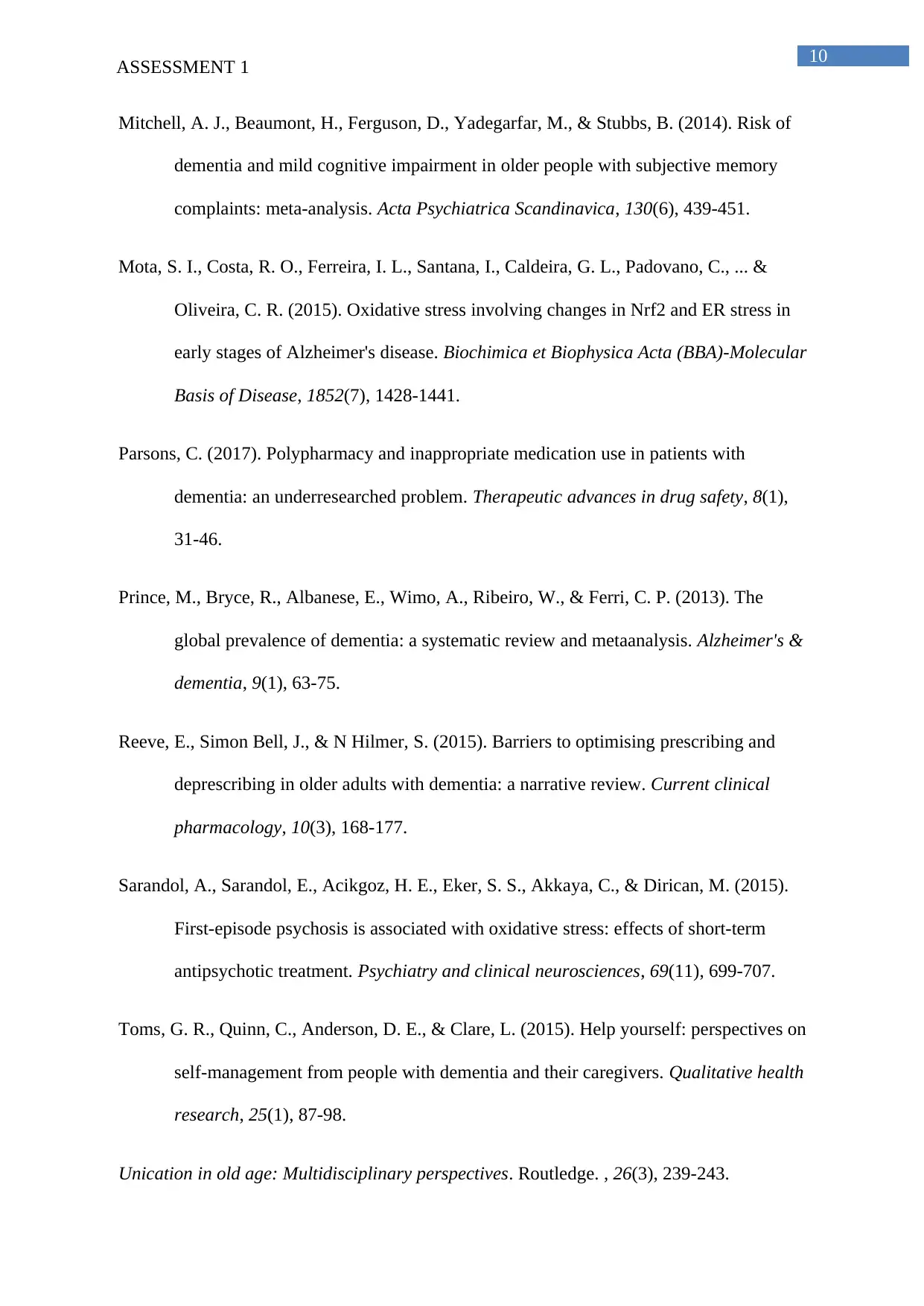
10
ASSESSMENT 1
Mitchell, A. J., Beaumont, H., Ferguson, D., Yadegarfar, M., & Stubbs, B. (2014). Risk of
dementia and mild cognitive impairment in older people with subjective memory
complaints: meta‐analysis. Acta Psychiatrica Scandinavica, 130(6), 439-451.
Mota, S. I., Costa, R. O., Ferreira, I. L., Santana, I., Caldeira, G. L., Padovano, C., ... &
Oliveira, C. R. (2015). Oxidative stress involving changes in Nrf2 and ER stress in
early stages of Alzheimer's disease. Biochimica et Biophysica Acta (BBA)-Molecular
Basis of Disease, 1852(7), 1428-1441.
Parsons, C. (2017). Polypharmacy and inappropriate medication use in patients with
dementia: an underresearched problem. Therapeutic advances in drug safety, 8(1),
31-46.
Prince, M., Bryce, R., Albanese, E., Wimo, A., Ribeiro, W., & Ferri, C. P. (2013). The
global prevalence of dementia: a systematic review and metaanalysis. Alzheimer's &
dementia, 9(1), 63-75.
Reeve, E., Simon Bell, J., & N Hilmer, S. (2015). Barriers to optimising prescribing and
deprescribing in older adults with dementia: a narrative review. Current clinical
pharmacology, 10(3), 168-177.
Sarandol, A., Sarandol, E., Acikgoz, H. E., Eker, S. S., Akkaya, C., & Dirican, M. (2015).
First‐episode psychosis is associated with oxidative stress: effects of short‐term
antipsychotic treatment. Psychiatry and clinical neurosciences, 69(11), 699-707.
Toms, G. R., Quinn, C., Anderson, D. E., & Clare, L. (2015). Help yourself: perspectives on
self-management from people with dementia and their caregivers. Qualitative health
research, 25(1), 87-98.
Unication in old age: Multidisciplinary perspectives. Routledge. , 26(3), 239-243.
ASSESSMENT 1
Mitchell, A. J., Beaumont, H., Ferguson, D., Yadegarfar, M., & Stubbs, B. (2014). Risk of
dementia and mild cognitive impairment in older people with subjective memory
complaints: meta‐analysis. Acta Psychiatrica Scandinavica, 130(6), 439-451.
Mota, S. I., Costa, R. O., Ferreira, I. L., Santana, I., Caldeira, G. L., Padovano, C., ... &
Oliveira, C. R. (2015). Oxidative stress involving changes in Nrf2 and ER stress in
early stages of Alzheimer's disease. Biochimica et Biophysica Acta (BBA)-Molecular
Basis of Disease, 1852(7), 1428-1441.
Parsons, C. (2017). Polypharmacy and inappropriate medication use in patients with
dementia: an underresearched problem. Therapeutic advances in drug safety, 8(1),
31-46.
Prince, M., Bryce, R., Albanese, E., Wimo, A., Ribeiro, W., & Ferri, C. P. (2013). The
global prevalence of dementia: a systematic review and metaanalysis. Alzheimer's &
dementia, 9(1), 63-75.
Reeve, E., Simon Bell, J., & N Hilmer, S. (2015). Barriers to optimising prescribing and
deprescribing in older adults with dementia: a narrative review. Current clinical
pharmacology, 10(3), 168-177.
Sarandol, A., Sarandol, E., Acikgoz, H. E., Eker, S. S., Akkaya, C., & Dirican, M. (2015).
First‐episode psychosis is associated with oxidative stress: effects of short‐term
antipsychotic treatment. Psychiatry and clinical neurosciences, 69(11), 699-707.
Toms, G. R., Quinn, C., Anderson, D. E., & Clare, L. (2015). Help yourself: perspectives on
self-management from people with dementia and their caregivers. Qualitative health
research, 25(1), 87-98.
Unication in old age: Multidisciplinary perspectives. Routledge. , 26(3), 239-243.
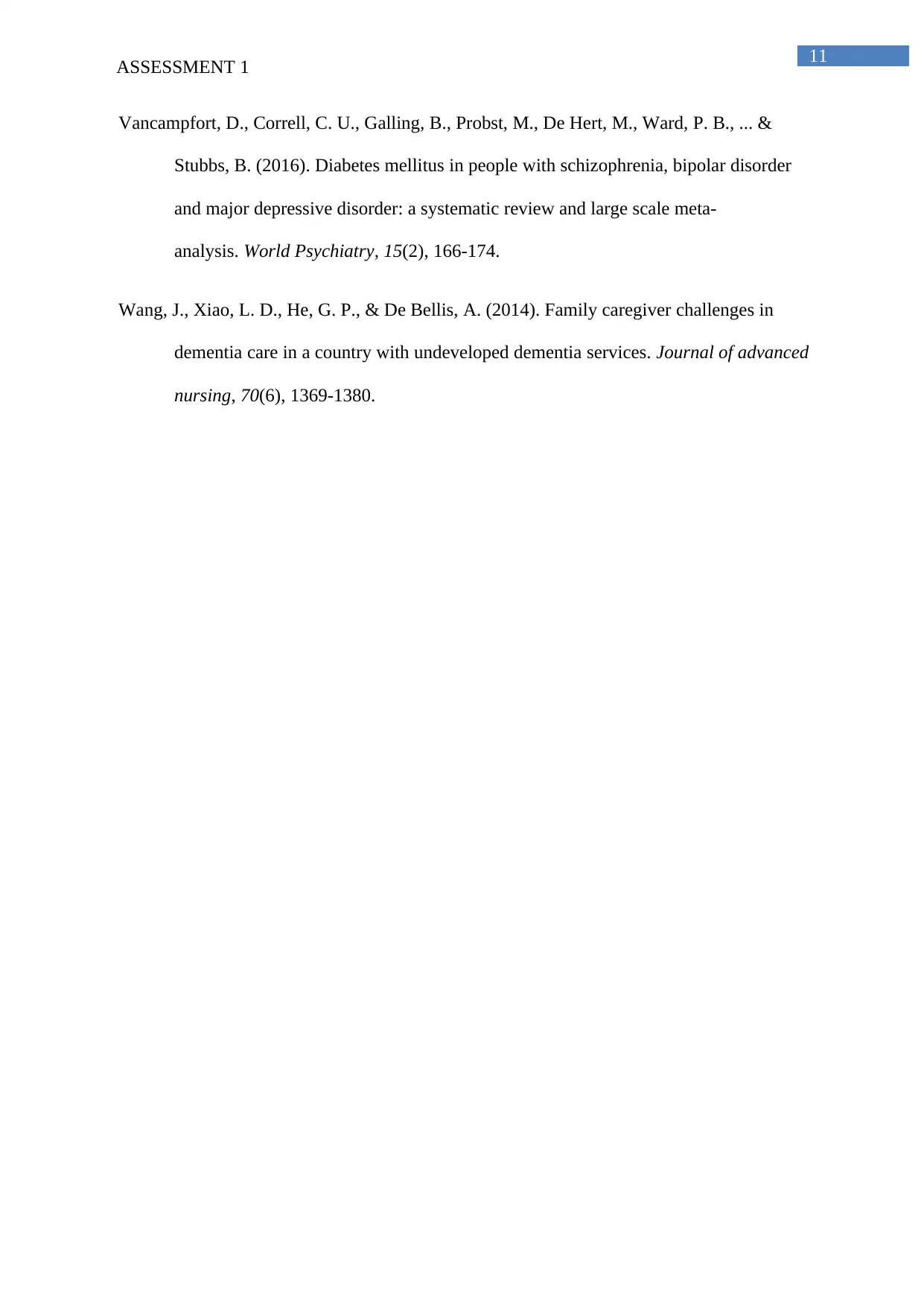
11
ASSESSMENT 1
Vancampfort, D., Correll, C. U., Galling, B., Probst, M., De Hert, M., Ward, P. B., ... &
Stubbs, B. (2016). Diabetes mellitus in people with schizophrenia, bipolar disorder
and major depressive disorder: a systematic review and large scale meta‐
analysis. World Psychiatry, 15(2), 166-174.
Wang, J., Xiao, L. D., He, G. P., & De Bellis, A. (2014). Family caregiver challenges in
dementia care in a country with undeveloped dementia services. Journal of advanced
nursing, 70(6), 1369-1380.
ASSESSMENT 1
Vancampfort, D., Correll, C. U., Galling, B., Probst, M., De Hert, M., Ward, P. B., ... &
Stubbs, B. (2016). Diabetes mellitus in people with schizophrenia, bipolar disorder
and major depressive disorder: a systematic review and large scale meta‐
analysis. World Psychiatry, 15(2), 166-174.
Wang, J., Xiao, L. D., He, G. P., & De Bellis, A. (2014). Family caregiver challenges in
dementia care in a country with undeveloped dementia services. Journal of advanced
nursing, 70(6), 1369-1380.
⊘ This is a preview!⊘
Do you want full access?
Subscribe today to unlock all pages.

Trusted by 1+ million students worldwide
1 out of 12
Related Documents
Your All-in-One AI-Powered Toolkit for Academic Success.
+13062052269
info@desklib.com
Available 24*7 on WhatsApp / Email
![[object Object]](/_next/static/media/star-bottom.7253800d.svg)
Unlock your academic potential
Copyright © 2020–2026 A2Z Services. All Rights Reserved. Developed and managed by ZUCOL.





